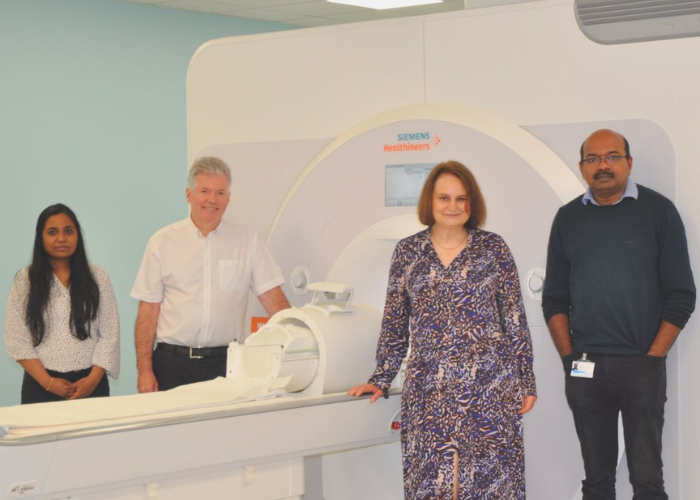Living Laboratory’s Radiofrequency (RF) Coil Used in Innovative Study on Motor Neuron Disease (MND)
Published: 14 August 2024
A new head-and-neck radiofrequency (RF) coil, which has been developed as part of the Living Laboratory’s Coil Development project, is set to provide new insights into the potential use of MRI scanning for diagnosis and monitoring of motor neuron disease (MND).
A new head-and-neck radiofrequency (RF) coil, which has been developed as part of the Living Laboratory’s Coil Development project, is set to provide new insights into the potential use of MRI scanning for diagnosis and monitoring of motor neuron disease (MND).
The innovative study is funded by leading Scottish charity MND Scotland, working with the Neurosciences Foundation. It aims to explore the capabilities of the head-and-neck coil, which has been developed in Glasgow by Dr Shajan Gunamony with funding from the Neurosciences Foundation, in conjunction with ultra-high-resolution 7-tesla (7T) magnetic resonance imaging (MRI) technology for diagnosing and monitoring the condition.
7T MRI is more sensitive and provides a higher resolution image than the 1.5T and 3T machines routinely used in hospitals, allowing scientists and clinicians to study the body in greater detail than ever before. When combined with the new head-and-neck coil, it will provide high-resolution images of the brainstem and upper spinal cord.
Based at the Queen Elizabeth University Hospital (QEUH), Professor Natasha Fullerton, Professor David Porter and Dr George Gorrie will use the 7-tesla (7T) MRI machine to test the head-and-neck coil for use in the identification of patterns of biomarkers in the brains of patients with MND.
The hope is that these biomarkers can be correlated with specific subtypes of MND, which could open the door to earlier diagnosis of the condition and more effective monitoring of responses to treatment. In doing this, the study aims to pave the way for new approaches that can improve outcomes for patients.
Professor Natasha Fullerton said: “We are delighted to receive this funding for MND research; and are excited to be part of a larger community contributing to research, that could help in the diagnosis of patients living with motor neuron disease. The funding will enable us to work on novel imaging techniques, that build on imaging innovations, resources and expertise available in Scotland. We hope this will lead to a more efficient, precise, and personalised diagnostic pathways for patients living with motor neuron disease across the UK.”
Director of Research for MND Scotland, Dr Jane Haley said: “Timely and accurate diagnosis of MND is really important for people and will become even more urgent once meaningful treatments are available. We are pleased to be working alongside the Neurosciences Foundation to support this project exploring whether new technology combined with high resolution brain MRI could provide a way forward.”
More information and details on how to join a Patient and Public Involvement group (PPI) to provide input into the study can be found on the MND Scotland website.
First published: 14 August 2024
<< News


